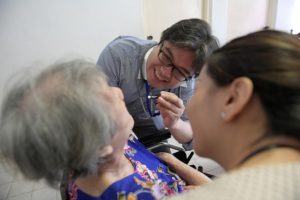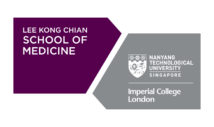Fewer hospital visits by dementia patients under new pilot
Eight years ago, Mr Ching Hong Rui, 45, quit his project coordinator job to care for his father full-time.

Photo by The Straits Times
Foo Jie Ying, The New Paper – He had to take his father, an advanced dementia patient, to the emergency department about once every three months, every time the elderly man had a fever or suffered a dip in blood pressure.
It was almost like clockwork, said Mr Ching.
He also had to decode his father’s facial expressions to find out why he was distressed, as his father could no longer talk.
All these changed two years ago when his father joined Programme Dignity, a palliative home-care pilot that caters to advanced dementia patients.
Visits to the hospital dropped to just once in two years. Mr Ching also better understood his father’s distress, thanks to advice and support from the Programme Dignity team.
“After my father was diagnosed, I said I would walk the whole journey with him. I am happy to have done it, but I could not have done it without the team,” said Mr Ching, whose father died last week.
His father was one of the 372 patients who joined the $1.5 million programme funded by Temasek Foundation Cares.
Led by Tan Tock Seng Hospital (TTSH) and Dover Park Hospice (DPH), the pilot ran from 2014 to this year. It was developed because of the rising prevalence of dementia here, said Dr Allyn Hum, its director.
A 2015 study here found that one in 10 people over 60 years old have dementia. For those over 85, it goes up to one in two.
Today, these patients are generally given palliative care in a hospital or hospice setting.
But such care, which is designed for terminal cancer patients, is not suitable for advanced dementia patients, who can no longer verbalise their pain or needs, said Dr Hum, a senior consultant in palliative medicine at TTSH and DPH.
She wanted to develop a care system that is “more than just dispensing drugs”.
In the pilot, which has an integrated model of care, patients spend their final days in the comfort of their homes, said Temasek Foundation Cares chairman Richard Magnus.
Once a week, nurses, medical social workers and doctors visit patients at home and work with their caregivers to alleviate symptoms, manage medical complications and address distressing behaviour – often a result of patients being unable to articulate their needs.
Dr Hum said they also help patients in non-pharmacological ways such as with music therapy.
As a result, hospital re-admissions and emergency room visits dropped by more than 70 per cent each, based on 331 patients tracked in the pilot.
Patients also showed fewer behavioural challenges and had improved quality of life.
The National Healthcare Group will work with DPH and other community partners to extend this new model of care to other non-cancer conditions.
DPH chairman Lionel Lee said the trick behind moving care into the community is to establish a seamless relationship between inpatient care and community care.
He added: “I think this was what we tried to establish between DPH and TTSH…”
Source: Fewer hospital visits by dementia patients under new pilot. The New Paper © Singapore Press Holdings Limited. Reprinted with permission.




